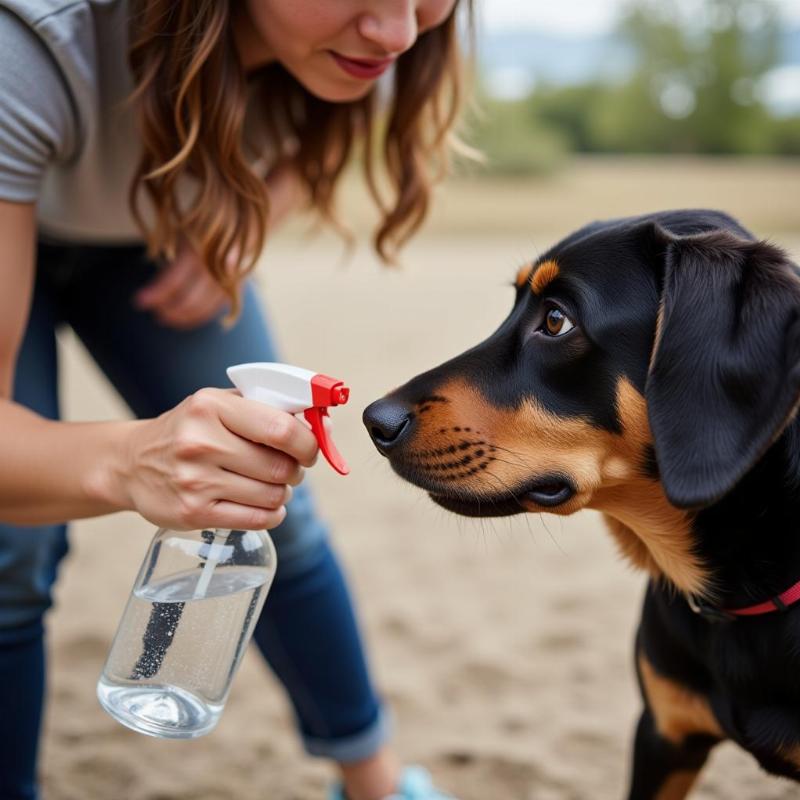Chewing is a natural behavior for dogs, but excessive or destructive chewing can be a frustrating problem for owners. If you’re searching for a “spray to get dogs to stop chewing,” you’re likely seeking a quick and effective solution. While deterrent sprays can be part of the solution, it’s essential to understand the underlying reasons for your dog’s chewing and address them holistically. This guide provides a comprehensive approach to managing destructive chewing in dogs, combining the use of deterrent sprays with training, environmental management, and providing appropriate chew toys.
Understanding Why Dogs Chew
Before reaching for a spray to get dogs to stop chewing, it’s crucial to understand why your dog is chewing. Puppies chew to relieve teething pain, while adult dogs may chew due to boredom, anxiety, or pent-up energy. Some breeds are also more prone to chewing than others. Identifying the root cause will help you choose the most effective solution. Is your dog chewing out of boredom? Anxiety? Or perhaps they’re simply teething?
Choosing the Right Deterrent Spray
Many deterrent sprays are available on the US market, formulated with bitter agents that dogs find unpleasant. Look for sprays specifically designed for dogs and safe for use on household surfaces. Always follow the manufacturer’s instructions carefully. Avoid sprays containing harmful chemicals or those intended for other purposes. Some sprays are designed for specific materials like wood or fabric. Consider your dog’s chewing habits and choose a spray accordingly. Do you need a spray for furniture, shoes, or perhaps even plants?
Combining Sprays with Training
 Dog Training with Spray
Dog Training with Spray
While deterrent sprays can discourage chewing on specific items, they are most effective when combined with training. Teach your dog the “leave it” command. When you see your dog approaching something they shouldn’t chew, say “leave it” firmly and offer them an appropriate chew toy instead. Positive reinforcement, such as praise and treats, will encourage your dog to choose their toys over your belongings. Consistency is key to success!
Managing Your Dog’s Environment
Creating a chew-proof environment is crucial. Put away valuable items, secure electrical cords, and remove anything potentially hazardous. Providing a safe and stimulating environment can also reduce chewing. Ensure your dog has plenty of appropriate chew toys. Rotate toys regularly to keep your dog engaged.
Providing Appropriate Chew Toys
Dogs need to chew! Offering a variety of textures and materials will satisfy their natural instincts and help prevent them from turning to your furniture. Durable rubber toys, rope toys, and even frozen treats can keep your dog entertained and their jaws busy. Consider your dog’s breed, size, and chewing habits when choosing toys. A small dog might not be able to handle a large, hard rubber toy, while a power chewer will need something extra durable.
Conclusion
Addressing destructive chewing requires a multi-pronged approach. While a spray to get dogs to stop chewing can be a helpful tool, it’s most effective when used in conjunction with training, environmental management, and providing appropriate chew toys. By understanding your dog’s needs and implementing these strategies, you can help them develop healthy chewing habits and protect your belongings.
FAQ
- Are deterrent sprays safe for my dog? Yes, most deterrent sprays are formulated with safe, bitter agents. Always choose a spray specifically designed for dogs and follow the manufacturer’s instructions.
- What if the spray doesn’t work? If the spray alone isn’t effective, consider consulting a professional dog trainer or veterinarian. They can help you identify any underlying issues and develop a tailored training plan.
- How can I prevent my dog from chewing when I’m not home? Crate training or confining your dog to a safe, chew-proof area can prevent destructive chewing while you’re away.
- What are some good chew toy options for puppies? Teething puppies benefit from soft rubber toys, frozen treats, and specially designed teething rings.
- My dog is chewing excessively even with plenty of toys. What should I do? Excessive chewing can be a sign of anxiety or boredom. Consider increasing your dog’s exercise, providing more mental stimulation, or consulting with a veterinarian or behaviorist.
- Are there any home remedies for deterrent sprays? While some home remedies exist, commercial sprays are often more effective and specifically formulated for dogs.
- How often should I apply the deterrent spray? Reapply the spray according to the manufacturer’s instructions, especially after cleaning or if your dog continues to chew on the treated area.
Related Articles
- train dog with spray bottle
- how do you stop a dog from chewing carpet
- spray for dog teeth cleaning
- how to stop dog from chewing dog bed
- what keeps dogs away from plants
Beautdogs.us is your premier source for all things dog-related in the US. We offer expert advice on dog breeds, care, and products. Whether you’re a new dog owner or a seasoned expert, Beautdogs.us is your trusted resource for comprehensive and engaging information on all aspects of dog companionship. Contact us at [email protected] or +1 501-555-7529 for any inquiries.